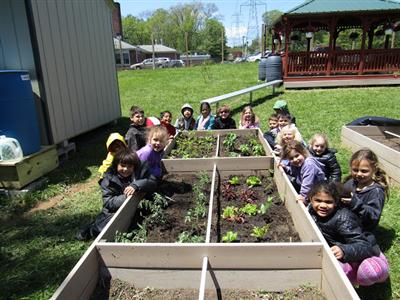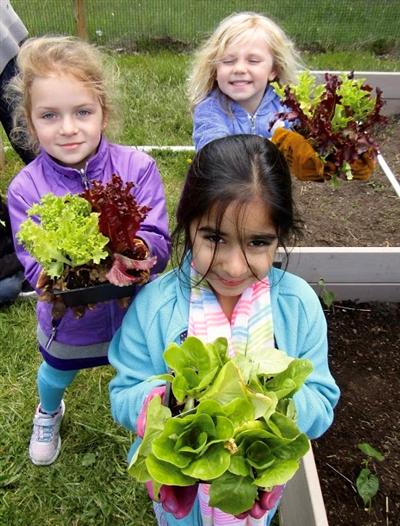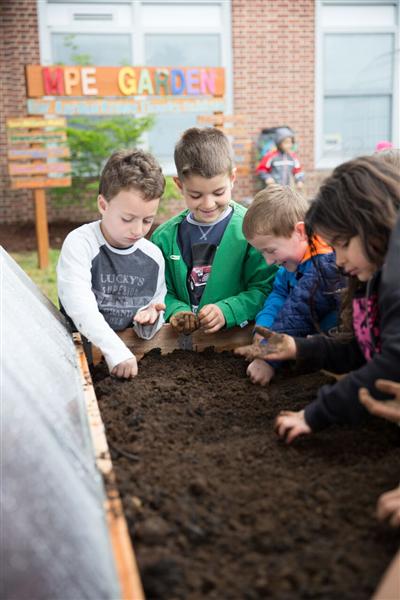-
 The Doherty brothers, Robby and Ryan, cut the ribbon on a new outdoor classroom at Mt. Pleasant Elementary in memory of their father, who alongside parent volunteers and staff, saw the possibilities of taking learning outside by transforming the school’s enclosed courtyards.
The Doherty brothers, Robby and Ryan, cut the ribbon on a new outdoor classroom at Mt. Pleasant Elementary in memory of their father, who alongside parent volunteers and staff, saw the possibilities of taking learning outside by transforming the school’s enclosed courtyards.
Robert Doherty helped build garden beds and set up an irrigation system in the school's first outdoor space. When he died of a rare cancer in 2014, the school community, already deeply rooted to the idea of connecting students to nature and nutrition, continued with the weeding, watering, and harvesting.
In just three years, the school now has two outdoor learning spaces. In the garden, teachers are planting the seeds of healthy lifestyles and leading lessons for students willing – and eager -- to get their hands dirty. In the outdoor classroom, which officially opened on May 5 with a garden party and health fair, students are offered respite and instruction outside the traditional classroom.“The MPE Rainbow Garden has become such an important part of our school,” said fifth grader Jolie Gasman, the president of the Student Council, during the outside classroom ceremony. “The students look forward to the spring and fall to learn about the life cycle of a plant, sustainability and our environment.”
Burnet Hill Elementary also enjoys a learning garden and gazebo. The school was awarded a grant from BASF Corp. to construct a drip irrigation system to improve how the garden is watered. On a recent Saturday morning, families and teachers worked side by side to prepare the garden for spring, weeding, preparing the soil for planting, planting seeds, and painting rocks for decorations. The Burnet Hill garden presented some challenges." The problem had always been that the available space for a garden was not near a water source," explained Dr. Dorian Gemellaro, supervisor of science, PreK-6. Student carried water jugs to the garden, only to have their plants not survive due to the lack of water. "They had struggled for years trying to generate a solution," Dr. Gemellaro said. "BASF oversees projects in Africa using water systems for sustainable agriculture. This work gave us the idea to install the drip irrigation system.”
The Burnet Hill garden presented some challenges." The problem had always been that the available space for a garden was not near a water source," explained Dr. Dorian Gemellaro, supervisor of science, PreK-6. Student carried water jugs to the garden, only to have their plants not survive due to the lack of water. "They had struggled for years trying to generate a solution," Dr. Gemellaro said. "BASF oversees projects in Africa using water systems for sustainable agriculture. This work gave us the idea to install the drip irrigation system.”
 Through the grant from BASF, the school was able to purchase rain barrels, gutters, piping, and all ancillary materials necessary to create a gravity powered drip irrigation system. “With these materials we installed a system that collects rainwater and uses gravity to water our school garden,” she said.
Through the grant from BASF, the school was able to purchase rain barrels, gutters, piping, and all ancillary materials necessary to create a gravity powered drip irrigation system. “With these materials we installed a system that collects rainwater and uses gravity to water our school garden,” she said.
The design of the system was difficult as wireless drip irrigation systems are not common in the area. Fortunately, Rutgers Cooperative Extension allowed the school to seek help from Dr. Amy Rowe, who drew up the sketches for the Burnet Hill system. The public schools’ maintenance department, overseen by Jamie Perrette, furthered enhanced and installed the system.
“This was a cooperative project. The kids are now benefitting from a garden that is functional and eco-friendly,” Dr. Gemellaro said.
 Collins Elementary has a new project, funded in part by the LEF and donations. Planting radishes in early spring connected to a math lesson on
estimation and measuring at tables placed next to the garden. There is a commitment at Collins from school leaders and teachers, and parents who are helping with present and future garden projects. Sherri Marrache, a Collins parent who helped create school gardens while living in Scarsdale, New York, has been an advocate. The school also has advisers assisting with the garden design, planting, and classroom science lessons.By the end of May, students harvested the radishes that they had planted and brought them home for salads and tasted leaves from beautiful snow pea plants.Parent-school partnerships at Mt. Pleasant Elementary have made that school's garden and outdoor classroom possible. Parent volunteers, including master gardener Jodi Rothfeld and project manager Stacey Rubinstein, spend a lot of time outdoors at MPE with school counselor Jennifer Kelner, custodian Carlos Duarte, teacher Christine Zambrio, and Principal Dr. Emily Codey. Other parents and teachers have also worked on the spaces.
Collins Elementary has a new project, funded in part by the LEF and donations. Planting radishes in early spring connected to a math lesson on
estimation and measuring at tables placed next to the garden. There is a commitment at Collins from school leaders and teachers, and parents who are helping with present and future garden projects. Sherri Marrache, a Collins parent who helped create school gardens while living in Scarsdale, New York, has been an advocate. The school also has advisers assisting with the garden design, planting, and classroom science lessons.By the end of May, students harvested the radishes that they had planted and brought them home for salads and tasted leaves from beautiful snow pea plants.Parent-school partnerships at Mt. Pleasant Elementary have made that school's garden and outdoor classroom possible. Parent volunteers, including master gardener Jodi Rothfeld and project manager Stacey Rubinstein, spend a lot of time outdoors at MPE with school counselor Jennifer Kelner, custodian Carlos Duarte, teacher Christine Zambrio, and Principal Dr. Emily Codey. Other parents and teachers have also worked on the spaces.
The school received funding from community connections, including the Livingston Education Foundation (LEF), a local nonprofit that has offered financial support to sustainable, innovative and organic outdoor learning environments at MPE and other schools. A grant from the LEF and Charles R. Bendit, LHS Class of ’71, funded the paving, stage and seating areas in the outdoor classroom.Saint Barnabas Community Health Foundation purchased a tree bench. A greenhouse is a gift from MPE families in memory of Robert Doherty. Labor costs have been donated by KMF360, a construction company owned and operated by MPE parent Andrew Braverman.
 Studies show that hands-on gardening, in combination with nutrition education, are an effective way to change children's attitudes about eating healthy foods. MPE connected those ideas with the garden party and a daylong health fair in partnership with Saint Barnabas Community Health Foundation. Conversations and activities focused on exercising (Zumba, yoga and rock climbing), nutrition, the environment, and mindfulness.
Studies show that hands-on gardening, in combination with nutrition education, are an effective way to change children's attitudes about eating healthy foods. MPE connected those ideas with the garden party and a daylong health fair in partnership with Saint Barnabas Community Health Foundation. Conversations and activities focused on exercising (Zumba, yoga and rock climbing), nutrition, the environment, and mindfulness.
The garden has grown from the first six beds Robert Doherty helped build, to include butterfly and herb gardens, trellises, bug “hotel,” and pumpkin patch. Crops planted include tomato, eggplant, green beans, carrot, radish, kale, blueberry, yellow squash, lettuce, cucumber, asparagus, pumpkin, watermelon, blue potatoes, potatoes, sweet potatoes, peas, bell peppers, and herbs (thyme, cilantro, parsley, basil, mint, oregano, dill, rosemary, and lavender).Over the summer, families participate in a garden co-op and volunteer to water and harvest – and then enjoy the fruits (and vegetables) of their labors. While a small amount of food is donated to CHOW, the local food pantry, “we really encourage children, families and teachers to complete the learning experience by eating food from our garden,” Rubinstein said. The harvest is still active when students return in September. This year, they’ll grow in all seasons with the addition of a cold frame to grow winter vegetables.The lessons learned connect to a wide variety of subjects. Under a colorful canopy of fall leaves, Mt. Pleasant Elementary teachers last fall conducted team-building exercises and explored ways to build movement into their teaching. Third graders have studied Native American gardening and planted the “Three Sisters” -- corn, beans, and zucchini. Grade 2 learned about the role of butterflies in the ecosystem. Kindergarteners enjoy stories read aloud by their teachers.
The photos in the slideshow are a sampling of the activities that took place during the May 5 health fair and ribbon cutting ceremony at Mt. Pleasant Elementary School. We are grateful to our school and community partners who made possible this enriching educational experience.Article by Marilyn Joyce Lehren
Select a School...
Select a School
- Burnet Hill Elementary School
- Collins Elementary School
- Harrison Elementary School
- Hillside Elementary School
- Mt. Pleasant Elementary School
- Riker Hill Elementary School
- Mt. Pleasant Middle School
- Heritage Middle School
- Livingston High School
- Livingston Education Foundation
- COVID-19 Advisory Information

